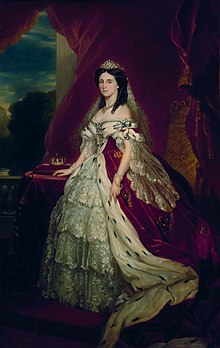Augusta of Saxe-Weimar-Eisenach
| Augusta of Saxe-Weimar-Eisenach | |||||
|---|---|---|---|---|---|

The Queen in coronation robes
|
|||||
| Queen consort of Prussia | |||||
| Tenure | 2 January 1861 – 9 March 1888 | ||||
| German Empress | |||||
| Tenure | 18 January 1871 - 9 March 1888 | ||||
| Born |
30 September 1811 Weimar, Saxe-Weimar-Eisenach |
||||
| Died | 7 January 1890 (aged 78) Berlin, German Empire |
||||
| Spouse | William I, German Emperor | ||||
| Issue |
Frederick III, German Emperor Louise, Grand Duchess of Baden |
||||
|
|||||
| House | Saxe-Weimar-Eisenach | ||||
| Father | Charles Frederick, Grand Duke of Saxe-Weimar-Eisenach | ||||
| Mother | Grand Duchess Maria Pavlovna of Russia | ||||
| Full name | |
|---|---|
| Augusta Marie Luise Katharina |
Princess Augusta of Saxe-Weimar-Eisenach (Augusta Marie Luise Katharina; 30 September 1811 – 7 January 1890) was the Queen of Prussia and the first German Empress as the consort of William I, German Emperor.
Augusta was the second daughter of Charles Frederick, Grand Duke of Saxe-Weimar-Eisenach and Maria Pavlovna of Russia, a daughter of Paul I of Russia and Sophie Dorothea of Württemberg.
While her father was an intellectually limited person, whose preferred reading up to the end of his life was fairy tales, Johann Wolfgang von Goethe spoke of Augusta's mother Marie as "one of the best and most significant women of her time." Augusta received a comprehensive education, including drawing lessons from the court painter, Luise Seidler, as well as music lessons from the court bandmaster, Johann Nepomuk Hummel.
Augusta was only fifteen years old when, in 1826, she first met her future husband, who was more than fourteen years older than her. Wilhelm thought the young Augusta had an "excellent personality," yet was less attractive than her older sister Marie, whom Wilhelm's younger brother, Karl, had already married. Above all, it was Wilhelm's father who pressed him to consider Augusta as a potential wife.
At this time, Wilhelm was in love with the Polish Princess Elisa Radziwill. The Crown Prince at the time was Wilhelm's elder brother, Crown Prince Friedrich Wilhelm (later Frederick William IV). He and his wife Elisabeth Ludovika had been married three years and had no children. Although it was not anticipated that they would remain childless (which turned out to be the case), the court did expect that Wilhelm, as heir presumptive to the throne, should make a dynastic marriage and produce further heirs. Frederick William III was indulgent of the relationship between his son Wilhelm and Elisa, but the Prussian Court had discovered that her ancestors had purchased their princely title from Maximilian I, Holy Roman Emperor, and she was not deemed noble enough to marry a potential King of Prussia. Ironically, Crown Princess Elisabeth Ludovika, who as a Bavarian princess was considered to be of correct rank, counted both Bogusław Radziwiłł and Janusz Radziwiłł among her ancestors, albeit through female descent.
...
Wikipedia
